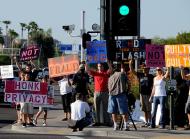1/12/2009
Arizona Group Launches Statewide Referendum to Ban Photo EnforcementLawmakers kick off an event designed to give Arizona voters the decision on whether to keep or reject red light and speed cameras.

Prominent lawmakers and law enforcement officials were among the first to sign a petition today that would, if approved, give Arizona voters the power to decide whether photo enforcement should continue in the state. The grassroots activist group CameraFraud.com held a rally at the state capitol building in Phoenix on the first day of the legislature's 2009 session. Citizens also lined up around the state Senate building for a chance to add their names to the petition.
"No traffic complaint... shall be issued or filed in the State of Arizona for an alleged violation... if the alleged violation was detected through the use of a Photo Enforcement System," the initiative states.
Speakers at the event included Senate Transportation Committee Chairman Ron Gould (R-Lake Havasu); state House Appropriations Committee Chairman Russell Pearce (R-Mesa), who is also a former chief deputy with the Maricopa County Sheriff's office; and newly elected Pinal County Sheriff Paul Babeu.
To qualify for the ballot, the petition must contain 153,364 verified signatures. CameraFraud organizers suggest that more than 200,000 signatures can be secured thanks to what they call the overreach of outgoing Governor Janet Napolitano (D) in ordering up to 200 photo radar vans on Arizona freeways to help balance the ballooning state budget deficit. Opposition to the freeway ticketing helped the Phoenix-area group grow from a handful of members to more than 800 in just six months. It has also spawned affiliate groups in Tuscon and Washington, DC, with more on the way.
"This initiative measure keeps the enforcement of our laws in the hands of trained law enforcement officers who are authorized by the people of Arizona, protects the citizens of Arizona from the abuses that accompany the outsourcing of law enforcement to private, for-profit corporations and ensures that the purpose of law enforcement remains to serve and protect and not to generate revenue for governments," the initiative's summary explains.
No photo enforcement program has ever survived a vote by the public. Cincinnati and Steubenville, Ohio recently voted to ban photo ticketing. Between 1991 and 1997, voters also turned out in Batavia, Illinois; Peoria, Arizona and Anchorage, Alaska to reject photo radar.
Article Excerpt:Text of End Photo Radar Initiative
An Initiative Measure PROPOSING AN AMENDMENT TO TITLE 28, CHAPTER 5, ARTICLE 4; ADDING SECTION 28-1590 PROHIBITING THE USE OF PHOTO ENFORCEMENT SYSTEMS
Be it enacted by the People of Arizona:
Section 28-1590, is proposed to be added as follows if approved by the voters and on proclamation of the Governor:
Section 28-1590. Prohibiting the Use of Photo Enforcement Systems.
A. No traffic complaint, notice of violation or other legal form of civil or criminal charge or citation shall be issued or filed in the state of Arizona for an alleged violation of this Title or of any other state, county or municipal law relating to the operation of a motor vehicle if the alleged violation was detected through the use of a Photo Enforcement System, as defined in subsection B of this section.
B. For purposes of this section, "Photo Enforcement System" means a device or system consisting of a radar unit or sensor linked to a (i) camera or other recording device that produces or is capable of producing one or more photographs, microphotographs, videotapes or digital or other recorded images of a vehicle's license plate or its operator or (ii) device that is capable of reading a motor vehicle's license plate or otherwise identifying a motor vehicle.


